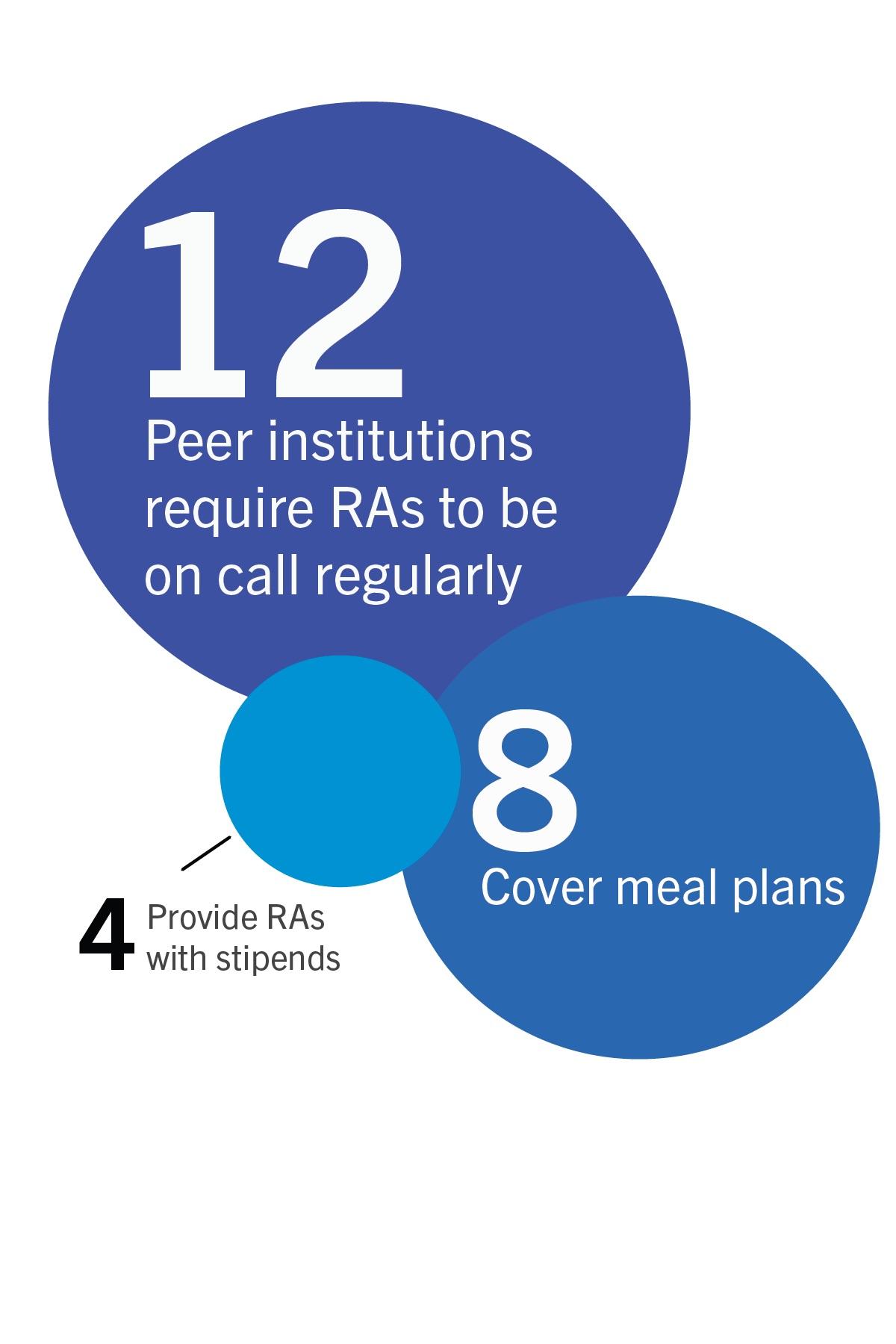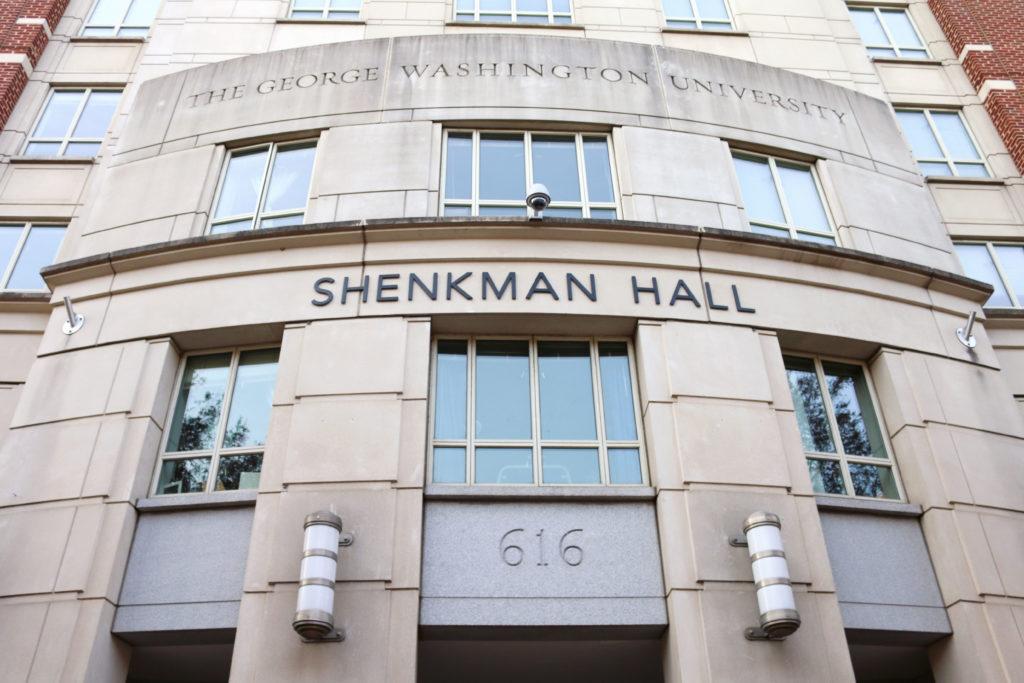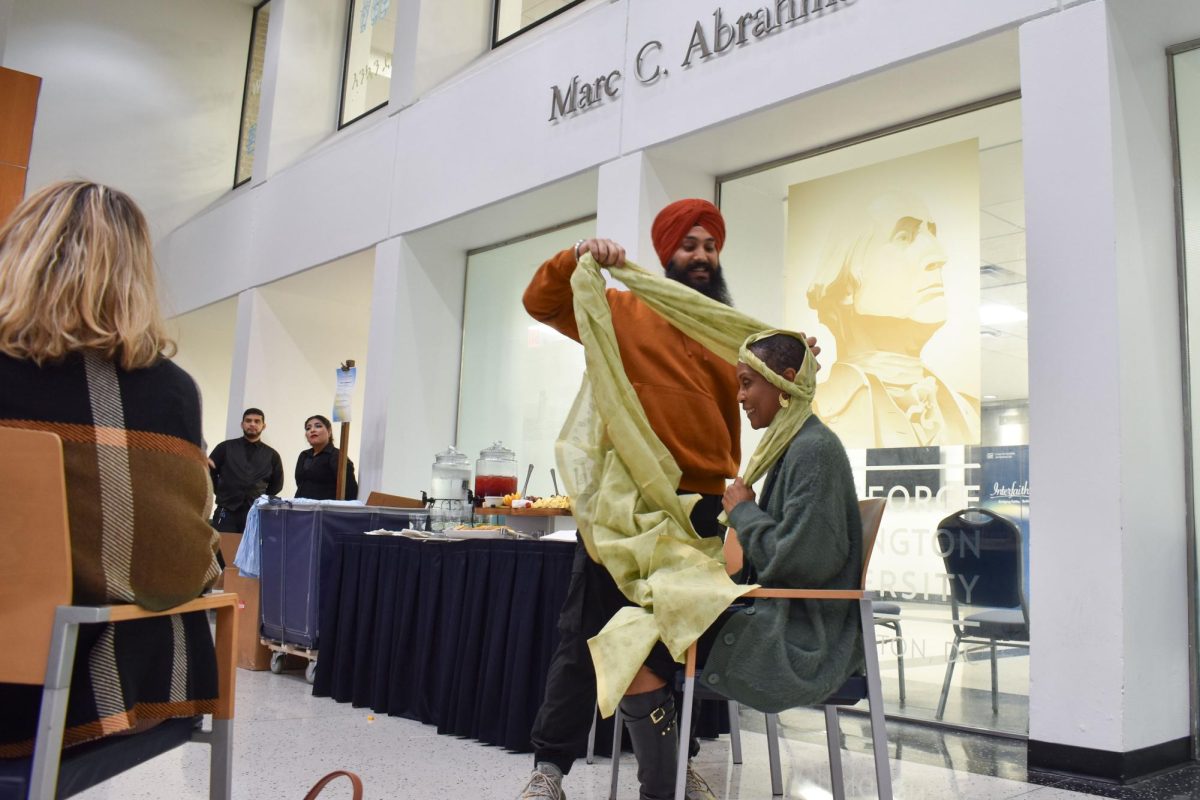When officials debuted a new agreement for resident advisers late last month, they aligned GW’s program with the majority of its 12 peer institutions.
The updates include hiring 27 additional resident advisers, offering students dining dollars instead of stipends as pay, requiring RAs to patrol their halls and giving some RAs roommates. While some RAs have vocalized concerns about the agreement, housing experts said the new plan brings GW up to speed with practices and policies that peers adopted years ago.
“This is a game changer – to be able to add 25 percent additional RAs to our buildings, to facilitate that kind of relationship – that just really isn’t necessarily possible or feasible in the way that it’s set up now and aligns ourselves better with our market basket and preeminent institutions,” Laurie Koehler, the senior vice provost for enrollment and the student experience, said.
Compensation
Under the new agreement, the University will give $3,050 to RAs with an in-unit kitchen in their residence hall room and $4,750 in GWorld funds to RAs without a kitchen. The advisers currently receive a $2,500 or $3,000 stipend, respectively, depending on whether they have a kitchen.
The University also offers RAs free housing during their tenure.
Of GW’s 12 peer schools, four provide stipends to their RAs, including Tufts, Wake Forest and Boston universities and the University of Miami, according to online RA contracts at each school. Ten institutions provide compensation for housing, and eight cover entire meal plans, including Georgetown and Syracuse universities.

Olivia Columbus | Staff Designer
Source: RA agreements
Eight peer institutions – New York, Georgetown, Northeastern, Syracuse and Tulane universities and the universities of Pittsburgh, Miami and Southern California – compensate RAs with both free housing and meal plans.
Boston, Wake Forest and Tufts universities and the University of Rochester do not completely cover dining for RAs. The University of Rochester funds the complete cost of the room but does not provide meal plans or stipends to RAs.
Tufts University covers room and board for first-year RAs, while upperclassman RAs are given a $1,500 stipend and 80 meals but have to pay for housing. Boston University gives all RAs free housing and covers the cost of meals for those without kitchens, but some RAs who have more responsibilities than others are given an additional stipend.
Safety precautions
Officials will require RAs to be “on call” once about every two months, meaning that they cannot leave their building for 12 hours and must remain available to assist residents. The new contract mandates that RAs patrol groups of residence halls twice during on-call periods.
All 12 peer schools require RAs to stay on call in their residence hall at least once a semester, and nine schools mandate that RAs patrol buildings by walking around the entire hall. The University of Pittsburgh and Tulane University require RAs to be on call and walk around a group of residence halls at least once a week, according to their respective RA contracts.
Stephanie Carter, the director of residence life at Wake Forest University, said requiring RAs to complete rounds and on-call shifts improves on-campus safety by ensuring all residents are accounted for every night.
“It’s really a benefit to have someone consistently walking the building and taking care of issues or getting the info to the people who can take care of the issues in a timely manner,” Carter said. “It’s truly for the safety and security of the residents and for the upkeep of our residence halls.”
David Zamojski, the assistant dean of students and the director of residence life at Boston University, said RAs are required to be on call two to four times a month for 16 hours during the week or 24 hours on the weekend. While RAs are on call, they are also required to complete rounds instead of relying on police officers to patrol buildings.
“There is, of course, an administrative role,” he said. “There is a sort of paperwork to complete, reports to write and hall responsibility.”
Roommates
GW will require some RAs in Shenkman and Amsterdam halls to share a bedroom with another student, while South Hall RAs will live in single rooms in suites with roommates. Five peers – the universities of Pittsburgh, Southern California, Rochester and Miami and New York University – assign roommates to some RAs, according to their respective contracts.
Tom Ellett, the senior associate vice president for student affairs and associate provost for university programs at New York University, said his some RAs at the school share suites with other students because most residence halls are laid out like apartments. RAs in buildings without suite living have single rooms, he said.
“We have had RAs who have a challenge with a particular roommate or suitemate from time to time, but I would say it’s the minority concern,” he said.
Daniel Watts, the director of undergraduate residential life at the University of Rochester, who is also a former RA at GW, said some RAs at Rochester live in suite-style residence hall rooms with single bedrooms. He said there are few conflicts when RAs choose their roommates, and random roommates are told in advance if they are placed in an RA suite.
“We’ve had people say, ‘I don’t want that, so I’ll take the next offer,’ but we also have a lot of people who say, ‘Great, no problem,’” Watts said. “I haven’t seen too much trouble with it, but when they all go into it with a mutual agreement, it always works better.”





